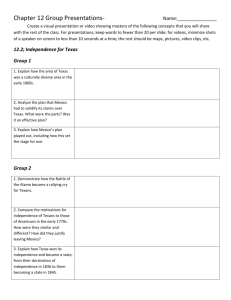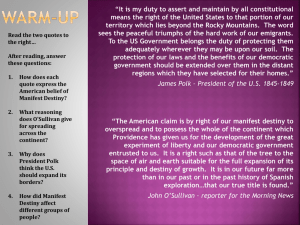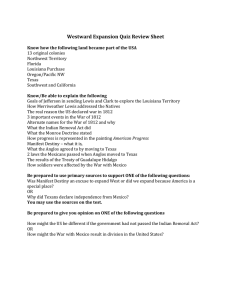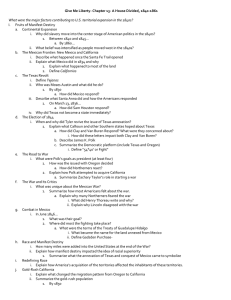Texas, manifest destiny and westward
advertisement
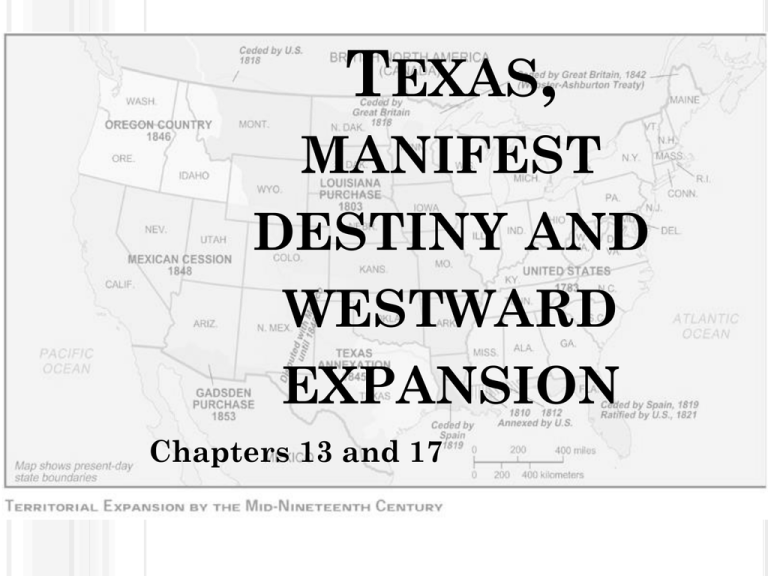
TEXAS, MANIFEST DESTINY AND WESTWARD EXPANSION Chapters 13 and 17 GONE TO TEXAS 1821 - 1823 Mexico gains independence from Spain Stephen Austin brings 300 families to Texas to settle with Mexican permission. The stipulations were: (1) they must become Mexican citizens (2) they must become Catholic (3) no slavery allowed These stipulations were largely ignored by the new settlers THE LONE STAR REBELLION Texans (among them Davy Crockett, Jim Bowie and Sam Houston) resented “foreign” government 1830: Mexico freed its slaves & prohibited them in Texas, much to the anger of citizens 1835: dictator Santa Anna started to raise an army to suppress the Texans 1836: Texas declares its independence. After armed conflict and slaughters at the Alamo (13 day siege) and at Goliad (both Mexican victories), Texan war cries rallied citizens, volunteers, and soldiers THE LONE STAR REBELLION After the Battle at San Jacinto, Mexico agreed to withdraw its troops from Texas The Rio Grande as the southwest border of Texas Texas was supported in their war by the US, but Andrew Jackson was hesitant to formally recognize Texas as an independent nation Jackson did recognize Texas independence on his last day before he left office, in 1837. Texans wanted to become part of the Union, but the slavery issue blocked this. The end was an unsettled predicament in which Texans feared the return of Santa Anna. LOG CABIN & HARD CIDER OF 1840 1840: Whigs nominate William H. Harrison (Old Tippecanoe) due to his being issueless and enemyless John Tyler (Va.): VP A Democratic editor also helped Harrison’s cause when he called Harrison a poor old farmer and identified him with many poor Westerners (who drank hard cider and lived in log cabins) With slogans of “Tippecanoe and Tyler too!” the Whigs promoted this “poor man’s president” idea The election was a protest against the hard times of the era (which party has been in office??) W.H. HARRISON AS PRESIDENT (BUT NOT FOR LONG) Daniel Webster (Secretary of State) Henry Clay (in the Senate) W.H.H. dies four weeks after his inauguration John Tyler becomes president The first to succeed to the presidency from the vice-presidency (“acting” president?) More of a Democrat than a Whig (didn’t like the B.U.S.; Clay and Webster don’t like him) Becomes a president without a party (“His Accidency”) In Case of the Removal of the President from Office, or of his Death, Resignation, or Inability to discharge the Powers and Duties of the said Office, the Same shall devolve on the Vice President, and the Congress may by Law provide for the Case of Removal, Death, Resignation or Inability, both of the President and Vice President, declaring what Officer shall then act as President, and such Officer shall act accordingly, until the Disability be removed, or a President shall be elected. ARTICLE II, SECTION 1, CLAUSE 6 (BACK) Our manifest destiny [is] to overspread the continent allotted by Providence for the free development of our yearly multiplying millions. - John L. O'Sullivan Texas has been absorbed into the Union as the inevitable fulfillment of the general law which is rolling our population westward....It was disintegrated from Mexico in the natural course of events, by a process perfectly legitimate on its own part, blameless on ours.... California will, probably next fall away from Mexico, imbecilic and distracted...The Anglo-Saxon foot is already on its borders....All this without agency of our government, without responsibility of our people--in the natural flow of events, the spontaneous working of principles.... - Democratic Review, 1845 What a prodigious growth this English race, especially the American branch of it, is having! How soon will it subdue and occupy all the wild parts of this continent and of the islands adjacent. No prophecy, however seemingly extravagant, as to future achievements in this way [is] likely to equal the reality. - Rutherford B. Hayes AMERICANS BELIEVED IN MANIFEST DESTINY = OUR NATION HAD A GOD-GIVEN RIGHT TO ALL OF NORTH AMERICA (FROM SEA TO SHINING SEA) What about the native populations? What about foreign nations that had claims in the West? There were opportunities to be had Mountain men went west to trap and trade. Missionaries hoped to convert Native Americans to Christianity. Lumberjacks and miners went to capitalize on timber and minerals. Farmers moved west to farm vast, rich lands. Entrepreneurs made their way to California AMERICAN PROGRESS BY JOHN GAST NEWS FROM SUTTER’S MILL 1848: gold was discovered in northern California. President James K. Polk announced the gold discovery in his State of the Union address on December 5, 1848. Americans caught “gold fever.” By 1854 as many as 300,000 people had migrated to California. LET’S HEAD BACK TO TEXAS AND EXAMINE ITS ANNEXATION IN THE CONTEXT OF MANIFEST DESTINY Proponents Americans who believed in Manifest Destiny wanted to admit Texas to the Union. Viewed the Texas Revolution in the spirit of the American Revolution. Southerners supported annexation because Texas allowed slavery, and its admission would boost the South’s political power (and expand farmland) Opponents Americans were concerned that the U.S. would have to bear the substantial Texas debt. Northerners opposed annexation because it would spread slavery westward and increase slave states’ voting power in Congress. Congress was concerned that the Constitution said nothing about admitting an independent nation. THE 1844 PRESIDENTIAL ELECTION Clay (straddled the Texas issue…seemed for it AND against it) vs. Polk James K. Polk, the strongly pro-annexation (no question) candidate and dark horse, wins Clay lost the close election largely when he lost New York thanks to the Liberty Party candidate (anti-Texas annexation) taking votes from him Their actions inadvertently won the election for Polk…which led to Texas getting annexed! And that is the problem Third Parties present…they don’t win but they can have serious implications for the election result THE ELECTION AND TEXAS Mexico warns that it would consider the annexation of Texas as a declaration of war. Voters in Texas overwhelmingly approved annexation once Polk was in office (statehood on December 29, 1845) The annexation of Texas enraged the Mexican government. o o Mexico never had recognized the Republic of Texas and broke off diplomatic ties with the U.S. In the twentieth century, it will be said "¡Pobre México! ¡Tan lejos de Dios y tan cerca de los Estados Unidos!" Polk (an advocate of manifest destiny) wanted the nation to acquire the land between Texas and the Pacific Ocean. However, these territories (New Mexico to California) belonged to Mexico Polk sought an opportunity to gain them 1845: special envoy John Slidell offered to cancel the $3 million in claims against Mexico in exchange for Mexico’s recognition of the Rio Grande as its boundary with the U.S. Additionally… …He was authorized to pay Mexico up to $30 million to purchase New Mexico and California for the U.S.A. No Mexican representatives would meet with him Polk ordered General Zachary Taylor (“Old Rough and Ready”) to take his troops into the disputed border territory. The U.S. used the event of a minor skirmish to declare war on Mexico. General Winfield Scott (“Old Fuss and Feathers”) marched his forces into Mexico City. U.S. forces soon controlled New Mexico and California When their capital fell, the Mexican government was forced to give in. The Treaty of Guadalupe Hidalgo (1848) forced Mexico to turn over a huge tract of land known as the Mexican Cession The U.S. paid Mexico $15 million. In England, “Brother Jonathan” meant a country bumpkin The name described Americans during the Revolution. In this 1847 British cartoon, Brother Jonathan is dreaming about the Mexican War (as the devil looks down). What is ironic about the title, “The Land of Liberty” and really all of this cartoon? The Gadsden Purchase completes our southern continental conquest by 1853 ($10,000,000) A southern transcontinental railroad?? WILMOT PROVISO What is to become of the Mexican Cession? Slave or Free? The Wilmot (Pa.) Proviso Slavery should never exist in lands gained from Mexico A way to thwart the attempts of the “slavocracy” to gain power in Congress Tried to get this passed at the beginning of the conflict Never does become law “Mexico will poison us.” Ralph Waldo Emerson The Civil War was ultimately Santa Anna’s revenge AND FINALLY, OREGON 1846: Polk tells British that joint occupation no longer acceptable “54’ 40” or fight!” England prepares for war, proposes division of the area Senate approves division of Oregon along 49o north latitude in 1846 SO, WAS JAMES K. POLK THE MOST SUCCESSFUL PRESIDENT IN THE HISTORY OF THE UNITED STATES? What did he promise in his campaign of 1844? To serve one term To lower tariffs (for revenue) To support the annexation of Texas To settle the Oregon boundary dispute with Great Britain To reestablish an independent treasury system To acquire territory from Mexico that eventually became California, New Mexico, Arizona, Nevada, Utah, and parts of Colorado and Wyoming
